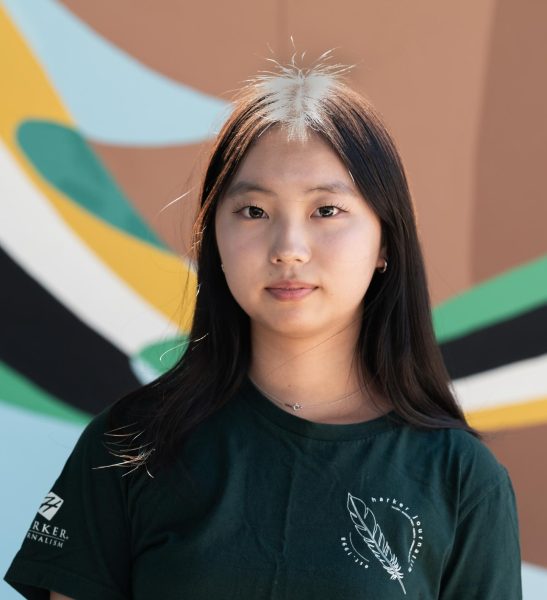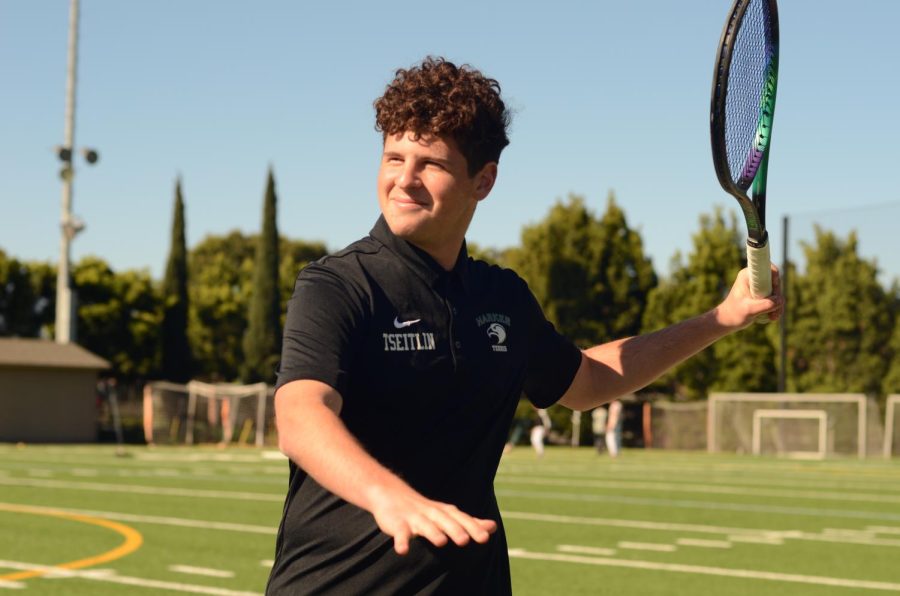Humans of Harker: Swinging into the present
Shika Tseitlin focuses on optimism through tennis
“Anything can happen in a tennis match. The score can flip really quickly. In that sense, I have to be really patient. So, in a match, if I’m losing a set, there’s still one more I can play. I have to reset, and I can continue trying,” Shika Tseitlin (12) said.
Shika Tseitlin (12) remembers one of his first tennis tournaments after rebounding from quarantine. After playing two tiring matches and beating two people ranked higher than him on the same day, he finally made it to the finals and ended up winning the entire tournament. Not only did the victory bring him immense joy, but his parents’ coming to see his final match made his triumph even sweeter.
Now, Shika ranks in the top 25 players in northern California, practices tennis everyday and regularly participates in tournaments. His father is a huge supporter of Shika’s tennis career, as he was also once a tennis player.
As an athlete, Shika sees tennis as an outlet for energy. When he started tennis at the age of five, Shika found tennis as an enjoyable hobby. While he still sees it as a fun activity now, he has also gained a sense of duty to play at his best level.
“For me, I try to be the best I can at whatever I can do, so [tennis] is one of those things,” Shika said. “I’ve put so much time and effort into it, [so] it’s only right for me to try and do the most I can in that category.”
Other than the physical aspect of the sport, the mental aspect of it has also shaped parts of Shika’s life. He has learned that instead of worrying about past mistakes, he should enjoy the present moment and make the most of the current situation. Without this mentality, he believes he would have been stuck at the same position and would have been unable to move forward with his life.
“Anything can happen in a tennis match,” Shika said. “The score can flip really quickly. In that sense I have to be really patient. So, in a match, if I’m losing a set, there’s still one more I can play. I have to reset, and I can continue trying.”
Rather than giving up because he is losing in a tennis game, Shika believes in second chances and always tries his best despite the difficulty of the given situation. Before looking at the negative aspect of the situation, he first looks at the positive side and does not cling onto previous mistakes. His unwavering diligence also plays a part in this mindset.
“I try my best to keep a high work ethic,” Shika said. “In tennis, I’ll definitely put a lot of effort into it. I’ll try to spend a lot of extra weekends and extra time with my coaches.”
To many people, tennis may merely be a slow, tiresome game, but to Shika it is similar to a battle with himself. Rather than comparing himself to his opponent, he focuses on only his own mental and physical state. Compared to many other sports, tennis requires more endurance.
“You have to be very patient with tennis,” Shika said. “In sports like football, you can have mental fluctuations, so you can be really excited and then really frustrated. But in tennis, you have to be the same.”
Even if Shika makes a mistake, he always tries to stand his ground and continue to maintain a calm mentality. He believes that there is always room for a person to grow and that there is no limit. Instead of panicking when he is currently losing, he instead tries to find optimism and puts in his utmost effort in order to get back in the game.
“When you’re thinking more actively, it’s like, ‘How do I fix it?’” Shika said. “You’re one step ahead in a way. You created a situation, and if you’re losing, you fix it.”
During the pandemic, Shika suffered from a back injury which halted his growth in tennis. He underwent six months of physical therapy, but through this break of tennis, he discovered a new passion — music composition.
“For me, if I am making a song or a melody, it’s super random,” Shika said. “I’ll do whatever I feel like because it is a creative outlet for me. I’ll put my phone on silent and let my mind grow. It’s just whatever comes to my head.”
Additionally, Shika enjoys trying new things such as cooking or baking. Even though he does not have a particular recipe that he enjoys to make, he finds happiness in baking or cooking different foods from scratch. He is very spontaneous and enjoys taking healthy risks.
“He is always really willing to try new things and go for it,” close friend Arthur Kajiyama (12) said.
Recently, Shika joined the varsity soccer team with just the experience of playing one semester of soccer in seventh grade. Although he initially joined the team to spend his last year of high school with his friends on the team, Shika used soccer as another outlet through which he can showcase his active personality.
“He is very energetic,” longtime friend Kaden Kapadia (12) said. “He always wants to do something. Whether it be chilling with his friends, or playing basketball in the park, he always wants to hang out with his friends.”
Although Shika has tried many new things throughout his high school career, tennis remains his top priority. Through tennis, Shika has learned perseverance and patience, and he hopes to continue to gain new lessons from the sport through college.
“I’ve been playing tennis for so long that I feel obligated to reach a certain level,” Shika said. “College tennis is that really high level that I want to play at and experience. I’m sure I’ll learn a lot about it if I do end up playing it.”

Young Min (12) is a Managing editor for the Winged Post, and this is her fourth year on staff. This year, she looks forward to making amazing newspaper...

Esha Gohil (12) is the co-editor-in-chief of Humans of Harker and the photo editor of Harker Aquila. This is her fourth year on staff, and this year she...


















![“[Building nerf blasters] became this outlet of creativity for me that hasn't been matched by anything else. The process [of] making a build complete to your desire is such a painstakingly difficult process, but I've had to learn from [the skills needed from] soldering to proper painting. There's so many different options for everything, if you think about it, it exists. The best part is [that] if it doesn't exist, you can build it yourself," Ishaan Parate said.](https://harkeraquila.com/wp-content/uploads/2022/08/DSC_8149-900x604.jpg)




![“When I came into high school, I was ready to be a follower. But DECA was a game changer for me. It helped me overcome my fear of public speaking, and it's played such a major role in who I've become today. To be able to successfully lead a chapter of 150 students, an officer team and be one of the upperclassmen I once really admired is something I'm [really] proud of,” Anvitha Tummala ('21) said.](https://harkeraquila.com/wp-content/uploads/2021/07/Screen-Shot-2021-07-25-at-9.50.05-AM-900x594.png)







![“I think getting up in the morning and having a sense of purpose [is exciting]. I think without a certain amount of drive, life is kind of obsolete and mundane, and I think having that every single day is what makes each day unique and kind of makes life exciting,” Neymika Jain (12) said.](https://harkeraquila.com/wp-content/uploads/2017/06/Screen-Shot-2017-06-03-at-4.54.16-PM.png)








![“My slogan is ‘slow feet, don’t eat, and I’m hungry.’ You need to run fast to get where you are–you aren't going to get those championships if you aren't fast,” Angel Cervantes (12) said. “I want to do well in school on my tests and in track and win championships for my team. I live by that, [and] I can do that anywhere: in the classroom or on the field.”](https://harkeraquila.com/wp-content/uploads/2018/06/DSC5146-900x601.jpg)
![“[Volleyball has] taught me how to fall correctly, and another thing it taught is that you don’t have to be the best at something to be good at it. If you just hit the ball in a smart way, then it still scores points and you’re good at it. You could be a background player and still make a much bigger impact on the team than you would think,” Anya Gert (’20) said.](https://harkeraquila.com/wp-content/uploads/2020/06/AnnaGert_JinTuan_HoHPhotoEdited-600x900.jpeg)

![“I'm not nearly there yet, but [my confidence has] definitely been getting better since I was pretty shy and timid coming into Harker my freshman year. I know that there's a lot of people that are really confident in what they do, and I really admire them. Everyone's so driven and that has really pushed me to kind of try to find my own place in high school and be more confident,” Alyssa Huang (’20) said.](https://harkeraquila.com/wp-content/uploads/2020/06/AlyssaHuang_EmilyChen_HoHPhoto-900x749.jpeg)



